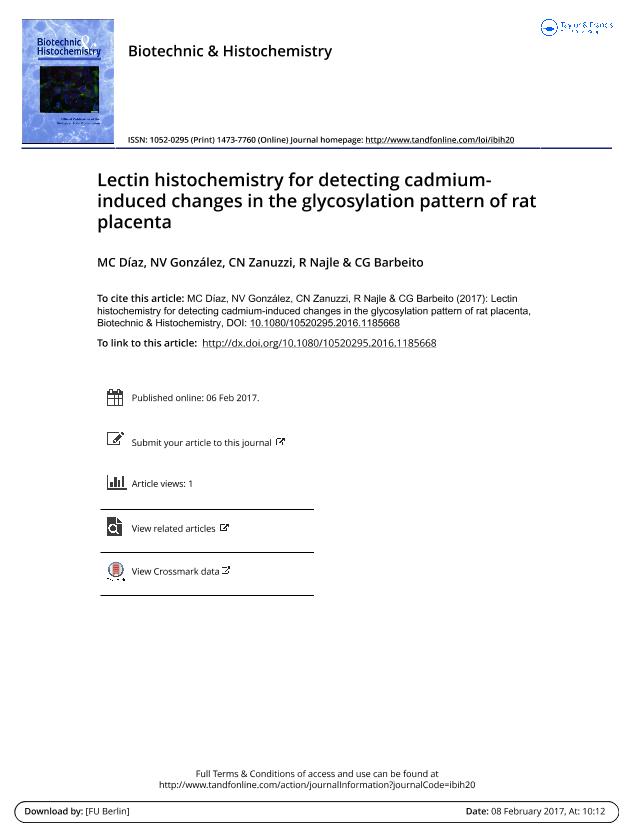Artículo
Lectin histochemistry for detecting cadmium-induced changes in the glycosylation pattern of rat placenta
Fecha de publicación:
01/2017
Editorial:
Informa Healthcare
Revista:
Biotechnic And Histochemistry
ISSN:
1052-0295
Idioma:
Inglés
Tipo de recurso:
Artículo publicado
Clasificación temática:
Resumen
Cadmium (Cd) is an industrial and environmental pollutant that produces toxic effects on gametogenesis, pre- and post-implantation embryos, and the placenta. Because the effects of acute Cd intoxication on the placenta are not well understood, we investigated changes in its glycosylated components in Cd treated dams at days 4, 7, 10 and 15 of gestation using lectin histochemistry. CdCl2 was administered to pregnant rats; control animals received sterile normal saline. Placentas were processed for DBA, Con A, SBA, PNA, UEA-I, RCA-I and WGA lectin histochemistry to evaluate changes in the carbohydrate pattern of the placenta that might modify cell interactions and contribute to embryonic alterations. Lectin binding was analyzed in the yolk sac; trophoblast giant cells; trophoblast I, II and III; spongiotrophoblast cells and endovascular trophoblast cells in the chorioallantoic placenta. Our lectin binding patterns showed that Cd caused alteration of SBA and DBA labeling of trophoblast-derived cells, which suggested increased expressions of α and β GalNAc. Cd also caused decreased UEA-1 binding affinity, which indicated fewer α-L-Fuc residues in placentas of Cd treated dams. The nonreactivity in trophoblast I of the control placentas incubated with Con-A contrasted with the labeling in placentas of experimental dams, which indicated increased expression of terminal α-D-Man, and α-D-Glc residues. We found that Cd altered the reactivity of placenta to several lectins, which indicated modification of the glycotype presented by the fetal component of the placenta. We report that Cd exerts a deleterious effect on the glycosylation pattern of the placenta.
Palabras clave:
Cadmium
,
Carbohydrate Moieties
,
Glycoproteins
,
Lectin Histochemistry
,
Placenta
,
Rat
Archivos asociados
Licencia
Identificadores
Colecciones
Articulos(CCT - LA PLATA)
Articulos de CTRO.CIENTIFICO TECNOL.CONICET - LA PLATA
Articulos de CTRO.CIENTIFICO TECNOL.CONICET - LA PLATA
Citación
Díaz, M.C.; González, N.V.; Zanuzzi, Carolina Natalia; Najle, Roberto; Barbeito, Claudio Gustavo; Lectin histochemistry for detecting cadmium-induced changes in the glycosylation pattern of rat placenta; Informa Healthcare; Biotechnic And Histochemistry; 92; 1; 1-2017; 36-45
Compartir
Altmétricas




